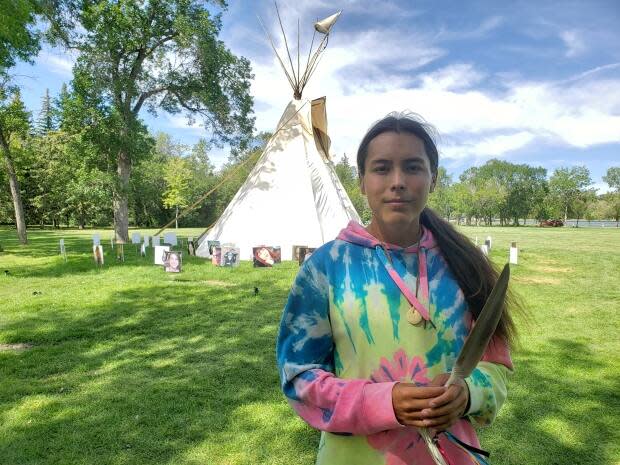'Neither too shouty nor dull': Experts weigh in on Sask. leaders' debate
Experts say the Saskatchewan leaders' debate on Wednesday night was civil and that both Saskatchewan Party Leader Scott Moe and Saskatchewan NDP Leader Ryan Meili did a good job of outlining their party platforms.
Jim Farney and Winter Fedyk joined Sam Maciag, host of the CBC Saskatchewan News at 6, after the debates to share their insights.
Farney is a political scientist and head of the University of Regina department of politics and international studies. Fedyk is a political strategist who started the Women for Saskatchewan website to amplify women's voices in politics.
Fedyk said that while there wasn't really anything new revealed during the debate, there were some "cheeky" comments on both sides.
She said Meili had some success pushing Moe on questions about the Global Transportation Hub and the Regina Bypass.
"So for Scott Moe to really hammer home … that the question is who do you trust? That is a bit risky, in my opinion," Fedyk said.
Mandatory face masks
Neither Moe nor Meili took a clear stance on making masks mandatory in public places, but Meili did criticize Moe for not providing more guidance.
Farney said he was surprised when Meili went on the attack over the topic of face masks, because the parties have been relatively successful at depoliticizing the response to the COVID-19 crisis.
As a doctor, medicine is Meili's area of expertise, but Farney said that so far Meili had deferred to the experts.
"I'd say he nudged right up to the line of trying to push over into that tonight. I think he stopped short, but I was a little bit surprised that he pressed as hard as he did on that point."
Education funding and economic uncertainty
More than once, Meili turned the conversation to smaller class sizes and support for schools, but Farney said he would have liked to have a clearer picture of what the package for education would be.
"I have a better sense, I suppose, of the direction that Meili wants to move in. But what is enough to solve the problems overall to get class sizes to an acceptable level? So I know what the government did and I know the direction that Meili wants to move in, but that's not a complete picture."
Farney said he also would have liked to see more of an acknowledgement from both parties about the economic uncertainty the province is facing right now.
"In the scrums after, Mr. Moe was making some pretty definite promises about no tax increases, for example. We are in probably the most uncertain economic condition that we've seen in my lifetime and that level of definity I was kind of surprised by."
Spending and cuts
Moe pushed Meili on the NDP's spending plans, pointing to $4 billion of spending allegedly unaccounted for in the NDP's platform.
Fedyk said she would have liked to see Meili push Moe more on some of his party's spending, like recently announced irrigation infrastructure.
Fedyk noted that the year before the Sask. Party came into power in 2007-08, provincial spending was $7.8 billion and in 2019-20, it was $15 billion — not including pandemic spending.
"We're really not having an honest conversation about what it is that we're spending our money on now," she said. "What are we getting for that money?"
Farney agreed, saying there were a lot of numbers getting thrown around.
"The talk of cuts is a little bit too easy. And we need to get to hard numbers on that."
'Real conversation' about Indigenous issues
Farney also noted this is one of the first Saskatchewan debates he's seen where Indigenous issues were discussed.
"Whatever you think of the content of that part of the debate, there was a real conversation about it. And I think that's a really important evolution in our province's history."
One Indigenous issue the debate tackled was the government's suicide prevention strategy and Tristen Durocher's suicide awareness campaign.
CBC's Saskatoon Morning spoke to two veteran MLAs, who retired just as this campaign began, to get their opinion on the debates. Nancy Heppner was a longtime Saskatchewan Party MLA for Martensville-Warman. Danielle Chartier represented Saskatoon Riverdale for more than a decade for the Saskatchewan NDP.

Chartier she said she was unimpressed with Moe's response to the questions about the government's suicide strategy.
"The strategy that this government currently has doesn't have timelines, doesn't have accountabilities, doesn't have resources committed to it," Chartier said. "We've got experts in the field who've said it's really not worth the paper it's written on."
Moe was also asked about his response to Tristen Durocher's campaign to raise awareness for suicide prevention.
"I felt as if Mr. Moe didn't answer those questions as well as he could have but it's hard to answer when you didn't actually go and speak to the young man," Chartier said.
Heppner said she agrees with Moe that legislation isn't needed to implement the province's Pillars of Life plan.
"There's still more work to do," Heppner said. "We've always said that there's no end date on this. There's always more work to do."
'Neither too shouty nor dull'
Both Heppner and Chartier agreed that both leaders did a good job.
"It wasn't an hour long of personal attacks, which I really appreciated," said Heppner.
"It was neither too shouty nor dull," said Chartier. "I thought that both men made their own case for their respective political parties very well. They laid out very different visions for the province."

